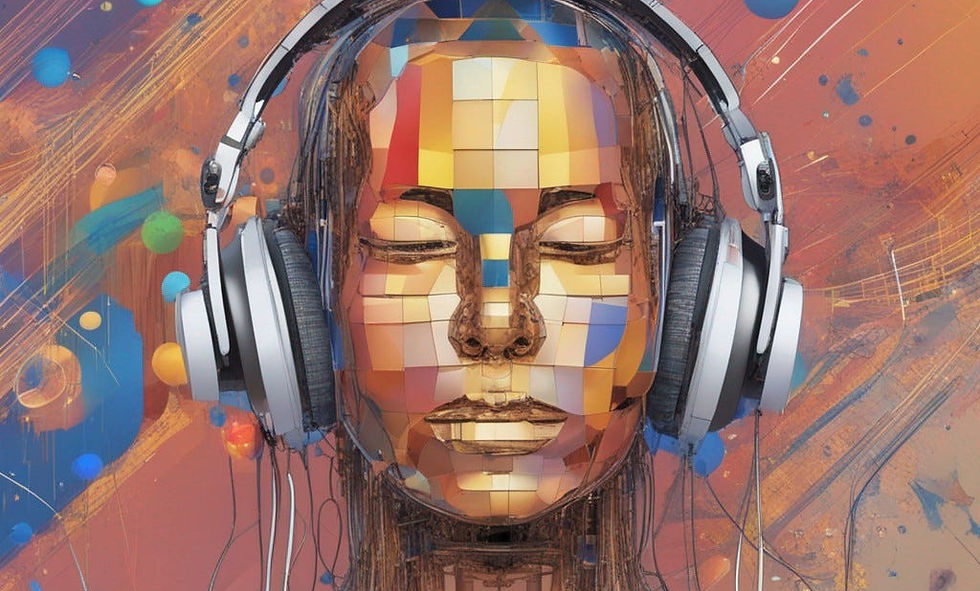Is AI generated music better than normal artist music
- Sep 12, 2025
- 4 min read
The music industry is rapidly changing with the rise of artificial intelligence (AI). This technology is reshaping how music is created, but it raises an important question: is AI-generated music superior to that crafted by traditional artists?

In this blog post, we will explore the strengths and weaknesses of both forms of music and what this means for the future.
Understanding AI-Generated Music
AI-generated music is composed through algorithms and machine learning techniques. These systems analyze large datasets of existing music to identify patterns and styles, enabling them to create new pieces that mimic human creativity. Tools like OpenAI's MuseNet, AIVA, and Amper Music populate the market, appealing to musicians and producers searching for new soundscapes.
The technology behind AI music generation is intriguing. Through neural networks, AI can generate melodies, harmonies, and even lyrics that engage listeners. For instance, a study showed that more than 60% of music producers reported using AI to help with compositions, illustrating how the technology can streamline the creative process while enhancing productivity.
The Appeal of Human Artists
In contrast, traditional artists offer a unique touch that AI simply cannot replicate. Musicians draw from their personal experiences, emotions, and cultural influences to connect with their audience. This storytelling element—found in lyrics, melodies, and performances—embodies what makes human creativity special.
Consider the success of artists like Taylor Swift, who draws inspiration from her life events. Songs like "All Too Well" resonate deeply with listeners because they relate to shared human experiences. A report even found that 75% of people feel more connected to music that expresses personal emotions compared to AI-generated compositions.
The Quality of AI-Generated Music
Opinions on AI-generated music quality vary significantly. Some listeners are surprised by the intricacy and originality found in these compositions, while others criticize them for their lack of emotional depth. AI excels in producing technically sound music, but it often falls short of conveying genuine emotions.
For example, AI can generate catchy tunes, but it might miss the authentic connection forged by human artists. A survey conducted by a music education platform revealed that 82% of respondents believed that human emotion is a critical component of music quality, suggesting that many listeners value this aspect highly.
The Role of Collaboration
Interestingly, many artists are beginning to embrace AI as an advantageous partner. Collaborations between human musicians and AI systems can lead to innovative results. By allowing AI to generate ideas or contribute during the composition process, artists can expand their creative boundaries.
This teamwork enables musicians to explore unfamiliar genres and styles that they might have overlooked. For example, the band YACHT used AI to generate a full album, mixing traditional songwriting with AI's ability to suggest new elements. This allows artists to retain their personal touch while experimenting with AI's unique capabilities.
The Future of Music Creation
As technology improves, we can expect a greater integration of AI in music creation. This transformation raises important questions about the role of human musicians. Will we see AI-generated music dominate, or will traditional artists maintain their significance?
One promising scenario is that AI democratizes music creation, allowing individuals with different skill levels to express themselves. This could lead to a more diverse array of sounds and styles, enriching the music landscape. Research indicates that genres like lo-fi and bedroom pop are gaining popularity, suggesting that music is evolving to reflect a more inclusive range of experiences.
The Ethical Considerations
With the rise of AI-generated music, several ethical considerations also emerge. Issues such as copyright, ownership, and job displacement in the music industry demand attention. For instance, if an AI creates a song, who owns the rights? Moreover, how might this impact human musicians' livelihoods?
These questions underline the need for a careful approach to AI's role in music. As technology evolves, establishing guidelines to protect artists while fostering innovation is crucial. A recent study suggested that 68% of creators are concerned about potential job impacts from AI, highlighting the importance of addressing these challenges as we move forward.
The Listener's Perspective
Ultimately, whether AI-generated music is superior to that of human artists is largely a matter of personal preference. Some listeners may appreciate AI's novelty and creativity, while others may prefer the emotional connection found in human-made music.
The music industry is broad, covering an extensive range of genres and styles. What resonates with one person may not with another, underscoring the importance of celebrating the diverse forms of musical expression available today.
Final Thoughts
The conversation around whether AI-generated music is better than music produced by human artists is complex. AI offers exciting opportunities for innovation and collaboration, yet it lacks the emotional resonance that human artists provide.
As technology continues to reshape the music scene, we are likely to see a blend of AI-generated works and human artistry. By embracing both approaches, we can cultivate a richer musical experience. Ultimately, the music that impacts you the most—whether created by AI or a human—is what truly matters. Remember, music is a universal language that resonates across boundaries, and there’s room for everyone in this evolving soundscape.




Comments